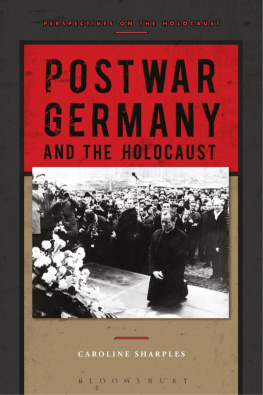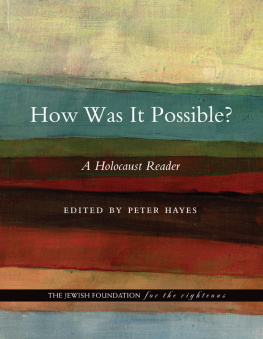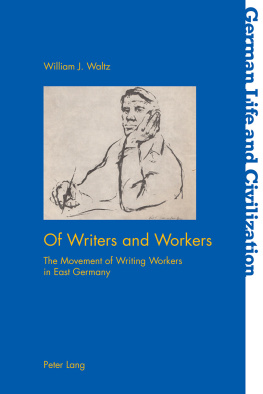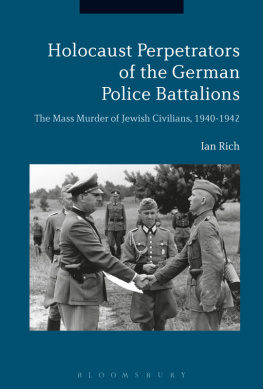In the Shadow of the Holocaust
Dialogue and Disjunction: Studies in Jewish German Literature, Culture, and Thought
Series Editors:
Erin McGlothlin (Washington University in St. Louis)
Brad Prager (University of Missouri)
In the Shadow of the Holocaust
Jewish-Communist Writers in East Germany
Thomas C. Fox
CAMDEN HOUSE
Rochester, New York
Copyright 2022 Thomas C. Fox
All Rights Reserved.Except as permitted under current legislation, no part of this work may be photocopied, stored in a retrieval system, published, performed in public, adapted, broadcast, transmitted, recorded, or reproduced in any form or by any means, without the prior permission of the copyright owner.
First published 2022 by Camden House
Camden House is an imprint of Boydell & Brewer Inc.
668 Mt. Hope Avenue, Rochester, NY 14620, USA
and of Boydell & Brewer Limited
PO Box 9, Woodbridge, Suffolk IP12 3DF, UK
www.boydellandbrewer.com
ISBN-13: 9781800102460 (ePUB)
Cover image: Revolt of the Prisoners by Fritz Cremer, bronze, 1958, Buchenwald Memorial Site. Photo by Bourgeon, 2011. WikiMedia Commons, Creative Commons Attribution-Share Alike 3.0 Unported license.
Library of Congress Cataloging-in-Publication Data
CIP data is available from the Library of Congress.
The publisher has no responsibility for the continued existence or accuracy of URLs for external or third-party internet websites referred to in this book and does not guarantee that any content on such websites is, or will remain, accurate or appropriate.
Preface
Parts of this study draw on my previously published material, which I have expanded, revised, and updated. I am grateful to the publishers for permission to utilize that material:
Border Crossings: An Introduction to East German Prose. Ann Arbor: University of Michigan Press, 1993.
Stephan Hermlins Negotiation of Jewish/Communist/German Identity. In Transcultural German Studies/Deutsch als Fremdsprache: Building Bridges/Brcken bauen, edited by Steven D. Martinson and Renate A. Schulz, 12031. New York: Peter Lang, 2008.
Stefan Heym and the Negotiation of Socialist-Jewish Identity. In Stefan Heym: SocialistDissenterJew/Stefan Heym: SozialistDissidentJude, edited by Peter Hutchinson and Reinhard K. Zachau, 14560. New York: Peter Lang, 2003.
In order to try to reach students and scholars of Holocaust studies, Judaic studies, comparative literature, and history, as well as those in German literature and German studies, I have translated quotations from German into English or used English translations when readily accessible. The original German is available in the footnotes. Titles of published translations are included in parentheses and capitalized headline-style, while unpublished translations are capitalized sentence-style.
I thank my colleagues and graduate students in the Department of Modern Languages and Classics at the University of Alabama, as well as former Dean of Arts and Sciences, Robert Olin, for their support over the years. Jim Walker of Camden House has been, as always, a patient and supportive editor. The two anonymous readers made numerous detailed and welcome suggestions for improvement that I have attempted to integrate as well as possible.
I owe a great debt of gratitude to my friends for their endless help: Stephen Brett, Nancy Carson and Michael Conaway, Melissa Kent and Paul Toppins, Paige and Mark McCormick, Jon and Lane McLelland, Catherine Roach and Ted Trost. I am especially grateful to my wife Tanusha. This book is dedicated to my family: Christopher, Eva, Katharina, and Tanusha.
Introduction
In the House of the Hangman
Writing in the New York Timesfrom the last days of East Germany in 1989, after the fall of the Wall and shortly before that country would disappear into West Germany, David Binder noted:
The Jewish issue here is complicated further by the fact that many of the top Communist leaders in power here after the war were men and women of Jewish origin. Among them were Hermann Axen, the foreign affairs specialist in the party Politburo until two months ago; Albert Norden, the late propaganda specialist in the Politburo; Gerhard Eisler, the chief commentator of East German radio; his brother, Hanns Eisler, the composer of the national anthem; the late Hilde Benjamin, Minister of Justice in the Stalinist period, and Markus Wolf, the former head of espionage.
Next page




